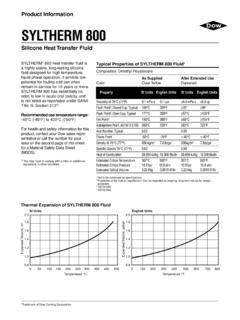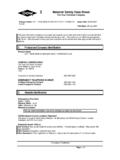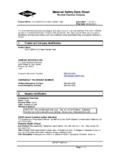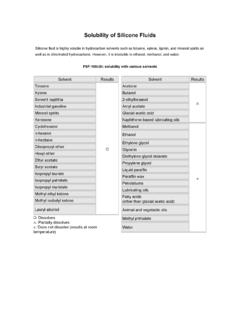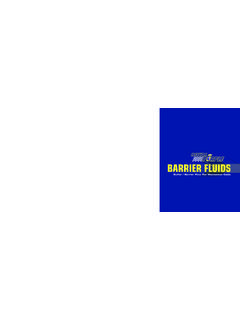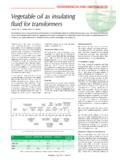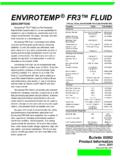Transcription of S XLT Heat Transfer Fluid - Loikits Distribution
1 SYLTHERM XLT. heat Transfer Fluid XLT. Product Technical Data 1. CONTENTS SYLTHERM XLT heat Transfer Fluid .. 4. Fluid Selection Criteria . Thermal Stability .. 5, 6. Simplified System Schematic .. 7. 8. Flammability and Fire Hazards .. 8. New System Start-up .. 9. Health and Safety Considerations .. 10. Customer Service Fluid Analysis .. 10. Retrofill .. 11. Storage and Shelf-life .. 11. Packaging .. 11. Properties and Engineering Characteristics . Physical Properties .. 11. Vapor Properties English Units .. 12. SI Units .. 12. Liquid Saturation Properties English Units .. 13.
2 SI Units .. 14. Thermal Conductivity .. 15. heat of Vaporization .. 16. Vapor Pressure .. 17. Specific heat .. 18. Density .. 19. Viscosity .. 20. Solubility of Water .. 21. Engineering Data . Liquid Film Coefficient English Units .. 22. SI Units .. 23. Pressure Drop English Units .. 24. SI Units .. 25. Thermal Expansion .. 26. Typical Liquid Phase Heating Scheme .. 27. 3. SYLTHERM XLT A Very Low Odor, viscosity is mPa s). A low heat Transfer Fluid Long-lasting heat Transfer viscosity at low operating tempera- Fluid That's Ideal for tures is a critical property because it allows high heat Transfer coefficients Batch Processing with low pressure drops and pump- ing horsepower.
3 SYLTHERM XLT heat Transfer The -150 F to 500 F (-100 C to 260 C). Fluid is a specially formulated, high operating range of SYLTHERM XLT. performance silicone polymer Fluid makes it ideal for single Fluid designed for use as a low tempera- process heating and cooling applica- ture, liquid phase heat Transfer tions (batch processing). Single Fluid medium. With a recommended processing with SYLTHERM XLT Fluid use temperature range of -150 F. eliminates process interruption and to 500 F (-100 C to 260 C), the loss of temperature control SYLTHERM XLT Fluid offers out- associated with multiple Fluid standing low temperature heat systems.
4 Batch processing with Transfer and pumpability, plus SYLTHERM XLT Fluid also eliminates excellent thermal stability. In system flush requirements associated addition, SYLTHERM XLT Fluid has with steam/brine and steam/glycol essentially no odor, is low in acute systems. SYLTHERM XLT Fluid is oral toxicity, and is not listed as noncorrosive toward metals and reportable under SARA Title III, alloys commonly found in heat Section These features make Transfer systems. SYLTHERM XLT Fluid a viable alter- native to many organic heat Transfer In addition to the performance fluids, chlorinated solvents, and advantages of SYLTHERM XLT Fluid , CFCs that are presently used for low Dow's supporting services are un- temperature, liquid phase service.
5 Equaled. They include technical backup in the design phase, during At -150 F, the viscosity of operation, and after shutdown. SYLTHERM XLT heat Transfer Fluid is Moreover, free analytical testing is only centipoise (at -100 C the provided to monitor Fluid condition. For Information About Our Full Line of To learn more about the full line of heat Transfer fluids manufactured or distributed by Dow including D OWTHERM* synthetic organic, SYLTHERM silicone and D OWTHERM, D OWFROST*, and D OWCAL*. glycol-based fluids request our product line guide. Call the num- ber for your area listed on the back of this brochure.)
6 *Trademark of The Dow Chemical Company Trademark of Dow Corning Corporation 1. You may need to comply with similar or additional legislation in other countries. Contact your Dow representative for information. 4. Fluid SELECTION CRITERIA SYLTHERM XLT Fluid is composed obtained by following sound primarily of volatile methylsiloxanes engineering practices in the design When evaluating thermal fluids for (VMS's). Until recently, VMS fluids of the heat Transfer system. Three specific applications, a variety of were classified as volatile organic key areas of focus are: designing and characteristics should be considered.
7 Compounds (VOC's) by the EPA. operating the heater and/or energy Four of the most important are Their status changed with the recovery unit, preventing chemical thermal stability, human health and agency's ruling of Oct. 5, 1994, contamination, and eliminating environmental regulatory status, which declared VMS fluids to be contact of the Fluid with air. freeze point, and viscosity. exempt from that classification. Heater Design and Operation The rule became final December 5, Stability 1994. Basically, the EPA said that Poor design and/or operation of the SYLTHERM XLT Fluid offers excellent VMS fluids do not contribute to fired heater can cause overheating, thermal stability at temperatures declining air quality; , smog.
8 Resulting in excessive thermal degra- between -150 F (-100 C) and dation of the Fluid . Freeze Point 500 F (260 C). The maximum When heaters are operated at high recommended film temperature is SYLTHERM XLT Fluid remains liquid temperatures, Fluid velocity in fired 550 F (290 C). below -150 F (-100 C). Freeze point heaters should be a minimum of is -168 F (-111 C). This eliminates Within its recommended use range, 6 feet per second (2 m/s); a range of many of the problems associated SYLTHERM XLT heat Transfer Fluid 6 to 12 feet per second (2 to 4 m/s). with cold weather start-ups and will not degrade to form solids or should cover most cases.
9 The actual shutdowns. Steam or electrical volatile compounds having substan- velocity selected will depend on an tracing, which is costly to install tially higher vapor pressures. As a economic balance between the cost and operate, is not needed. result, system downtime for periodic of circulation and heat Transfer Fluid reprocessing and replacement Viscosity surface. Operating limitations are is eliminated. SYLTHERM XLT usually placed on heat flux by The excellent viscosity characteristics Fluid can tolerate occasional high- equipment manufacturers. This heat of SYLTHERM XLT Fluid at low temperature upsets with only flux is determined for a maximum temperatures make it an efficient minimal change to the physical film temperature by the operating choice for very low temperature properties of the Fluid .
10 However, conditions of the particular unit. applications. The low viscosity extended use at bulk temperatures Some problem areas to be avoided of SYLTHERM XLT Fluid at low above 500 F (260 C) or film include: temperatures (only cps at -150 F, temperatures greater than 550 F mPa s at -100 C) minimizes 1. Flame impingement. (290 C), has the potential to pressure drop and reduces pumping generate higher system pressures 2. Operating the heater above its horsepower requirements. In addition, and cause polymer cross-linking to rated capacity. high heat Transfer coefficients can occur.
